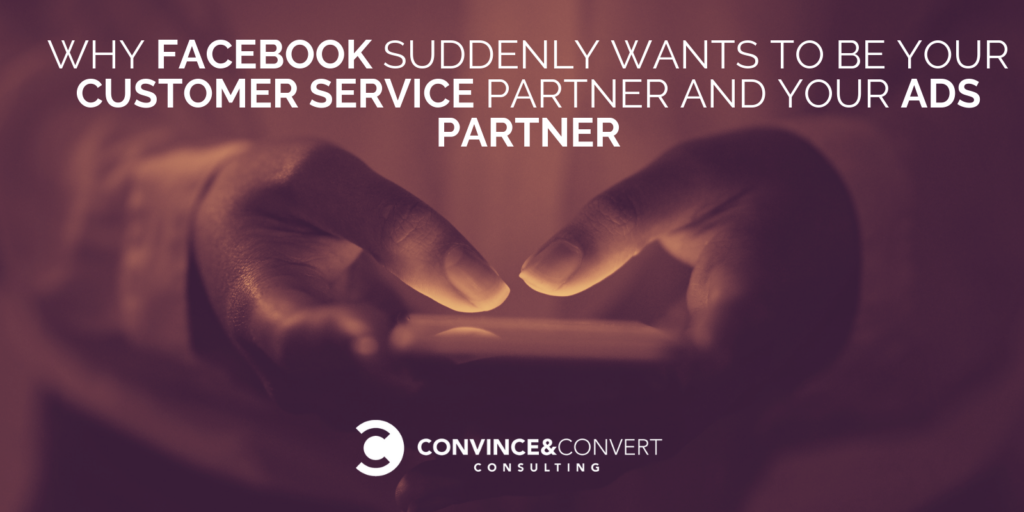
Facebook’s recent announcements that they are beefing up Messenger and adding a bevy of new tools for businesses to use Messenger to interact with customers is just the most recent salvo in Facebook’s long-standing battle to become truly indispensable at all stages of the customer relationship cycle.
If can reasonably be stated that Facebook is already “winning” its fight to become indispensable at the top and middle of the funnel, as they are now in the same paragraph as Google as a customer acquisition behemoth. Digital advertising expenditures surpassed offline spend for the first time recently, and Google and Facebook are by far the largest players (although Amazon is making up ground).
But, as every Facebook user knows, the company is running out of real estate to place ads in News Feed, Instagram, and even Instagram Stories. Hence, their introduction of new ad-customization tools in Messenger and WhatsApp.
More important, however, is Mark Zuckerberg’s declaration that:
The future is private.
A callous person might suggest that this swing toward privacy, groups, and encrypted messaging is an overdue response to a series of increasingly eye-opening kerfuffles about Facebook selling our data in ways that are inappropriate at best, and probably unlawful.
And yes, that’s a cynical viewpoint, that the company that dominates global communications in ways formerly thought to be unthinkable would simply shift focus due to regulatory and customer scrutiny. But, it’s not actually cynical enough.
You see, this is all part of the PLAN at Facebook, and has been all along.
As I wrote about in The Facebook Messaging Push Is Not About Privacy — It’s About Control recently:
“Taking over the role of SMS and email has been Facebook’s true master plan since the WhatsApp acquisition in 2014, and now that the news feed is waning, they are executing on that strategy, and wrapping it in a convenient veil of “we now love privacy.” Bullshit. They love revenue and the ability to use messaging to learn even more about users, thus giving them the ability to sell more targeted (read: more expensive) ads.”
And why do companies use messaging (whether email, SMS, or messaging apps)? Primarily to communicate with CURRENT customers, more so than potential ones. You see, what Facebook is doing — and has always envisioned — is becoming the wiring for how companies interact with consumers once they become customers. Because when you play that role it is FAR harder to be displaced.
You can move ad dollars around from Facebook to Twitter to Google to display to whatever. You can test campaigns. You can experiment. But you’re not going to A/B test your order confirmation system. You’re not going to take a flier on how you set appointments for your business. Once that’s in place, you’ll do whatever it takes to not mess with it. The switching costs are too high.
TechCrunch describes Facebook’s new messaging and appointments features like this:
“After a rough start to its chatbot program a few years ago, where bots couldn’t figure out users’ open-ended responses, (Facebook’s) Chudnovsky says the platform is now picking up steam with 300,000 developers on board. One option that’s worked especially well is lead-generation templates, which teach bots to ask people standardized questions to collect contact info or business intent, so Messenger is adding more of those templates with completion reminders and seamless hand-off to a live agent.
To let users interact with appointment-based businesses through a platform they’re already familiar with, Messenger launched a beta program for barbers, dentists and more that will soon open to let any business handle appointment booking through the app. And with new authenticated m.me links, a business can take a logged-in user on their website and pass them to Messenger while still knowing their order history and other info. Getting more businesses hooked on Messenger customer service could be very lucrative down the line.”
You think? Very lucrative, indeed.
Want to Know Where Facebook is Headed? Watch WeChat
The one company Facebook can’t touch (yet) in term of utility up and down the customer journey is WeChat. In Asia, WeChat is EVERYTHING. It is interwoven into society far more than Facebook is in the United States, or anywhere. This is partially because WeChat has always ridden on top of a messaging platform fundamentally, and as Facebook’s Head of Messaging Stan Chudnovsky said this week:
We believe you can build practically any utility on top of messaging.
And build it, they will.
As of January 2019, WeChat claims over one billion DAILY users. It’s so incredibly popular because it somehow weaves together news, entertainment, messaging, commerce, and games into one mobile-only platform that is not impossible to navigate.
Embrace With One Eye Open
I’m not against Facebook Messenger. Or WhatsApp. Or even the new version they are cooking up that will combine those two with Instagram messaging. In fact, I’d argue that these apps are among the least objectionable elements of the entire Facebook ecosystem, as they give consumers the highest relevancy, most control, and greatest amount of privacy — in theory.
But it’s important that before we all embrace Facebook’s pivot from public News Feed to private groups and messaging, and their relocation of strategic focus from advertising to interactions, and their emphasis shift from acquiring your new customers to interacting with your current ones, that we all understand what’s really going on here:
They are spidering your organization. They are making themselves useful in more contexts, and throughout the customer lifecycle. And like gum on your shoe, once you step on it, it’s going to be even harder to scrape off.